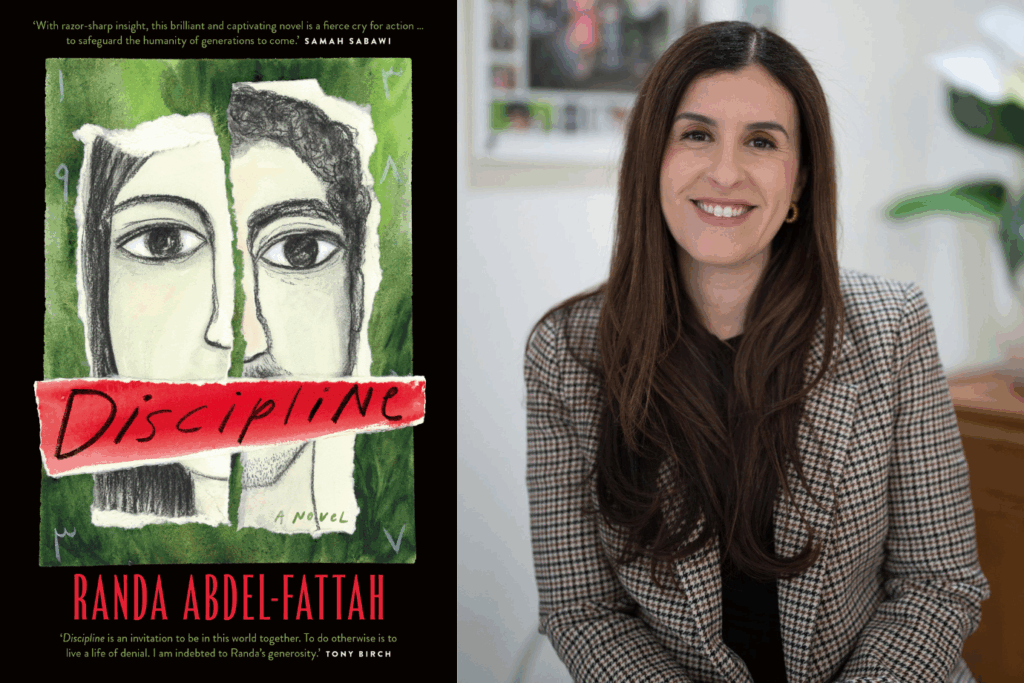When those with a voice choose to stay silent towards injustice, the whole world pays the price.
Exploring this theme and more, Dr Randa Abdel-Fattah’s new book Discipline couldn’t have come at a more critical period in time, as Israel’s genocide in Gaza rages on. The book, published on 3 September, has the pace of a thriller and utilises fiction to examine some of society’s most urgent questions, including free speech, censorship, and cost of speaking up in academia and the media.
The story follows Ashraf, an academic whose career and personal life are in freefall, and Hannah, a young journalist struggling to honour the voices of her community. Each of their journeys take place as Israel’s bombardment of Gaza intensifies into the final weeks of Ramadan, and the characters must reckon with their choices and values in the pursuit of what is right or wrong.
Dr Abdel-Fattah tells Women’s Agenda that the question she’s asking people with this book is ultimately a moral one.
“What can you live with? When I talk about the cost of silence, it’s very obvious that I’m talking about what’s happening in Gaza,” she says.
“The ultimate cost is people’s lives. People are dying because of your silence, your refusal to sign a statement, your refusal to say things as they are, your insistence on repressing and censoring.”
“But ultimately, what I’ve asked my characters and therefore my readers, to think about, is the ultimate cost: your conscience and living with yourself and living with your silence.”
Dr Abdel-Fattah is a leading advocate for Palestine and a prominent academic, author, and former lawyer, and now ARC Future Fellow at Macquarie University, currently under suspension.
She started writing the book in late 2021 and was still writing as Israel’s genocide in Gaza began after October 2023. That’s when she says her writing began to focus on two fields where she was witnessing the “most repression” occurring: academia and media.
“I decided I would actually contextualise [the book] in Gaza 2021, kind of foreshadowing where you end up if you don’t speak up when you have a chance. You end up with a genocide that’s livestreamed.”
The decision to write the book as fiction came from an understanding of the kind of creative freedom this allows for, Dr Abdel-Fattah says.
“I’ve always felt so strongly about the power of fiction and the power of art to be able to circumvent propaganda and repression and censorship,” she says, adding that fiction is “a space of survival” and a space that gives “freedom to speak”.
She adds that it also allowed her to better explore the “emotional toll” that “young Arab Muslim journalists go through in those newsrooms, or what a Palestinian student in a university faces through the language of policies and even the weaponisation of diversity”.
“To create that empathy and validation first and foremost for readers was important to me.”
Ironically, Dr Abdel-Fattah says her book, which explores censorship, was challenged ahead of publishing by groups looking to cancel its release.
She has also made headlines for her powerful stance against censorship at the Bendigo Writer’s Festival last month. Dr Abdel-Fattah was among a number of prominent authors and activists who boycotted the event over concerns about free speech in relation to Israel’s genocide in Gaza and expressions of solidarity with Palestinians.
“When we talk about Palestine and genocide, in particular, it’s a crime against humanity,” Dr Abdel-Fattah says, noting that it’s called this because “it doesn’t just impact Palestinians, it impacts everybody”.
“If Palestinians don’t get international law, no one will get it, because what you have done is completely delegitimise an entire system. If Palestinians don’t get the right to life and to education and to a childhood and to safe hospitals and schools and universities, then nobody eventually is going to get that. It’s not going to stop there.”
“We all have a role to play. We are all responsible for stopping this. Nobody has the luxury of saying it has nothing to do with me, it has everything to do with everybody.”


